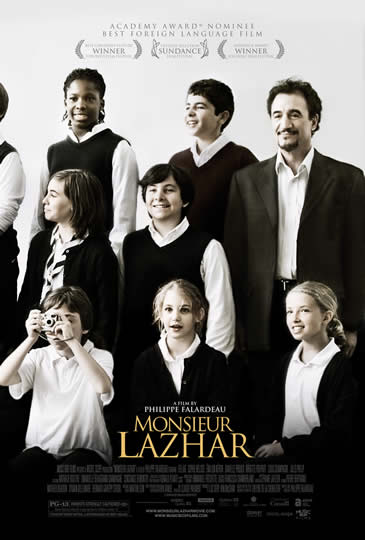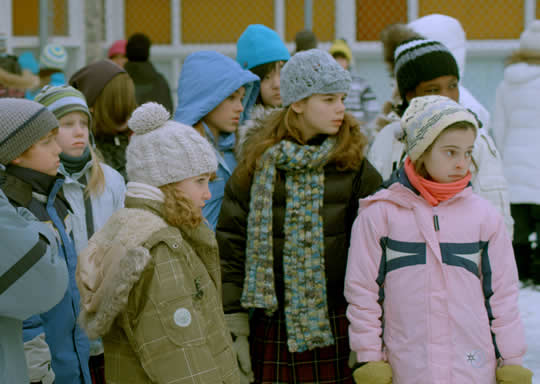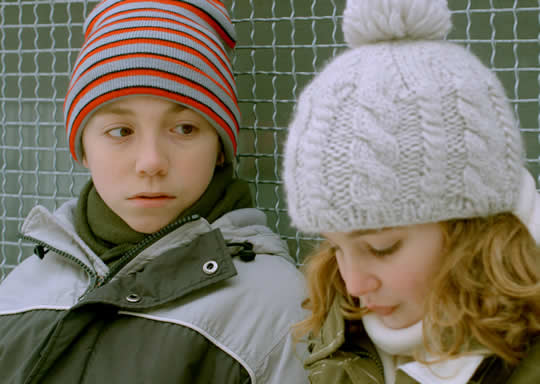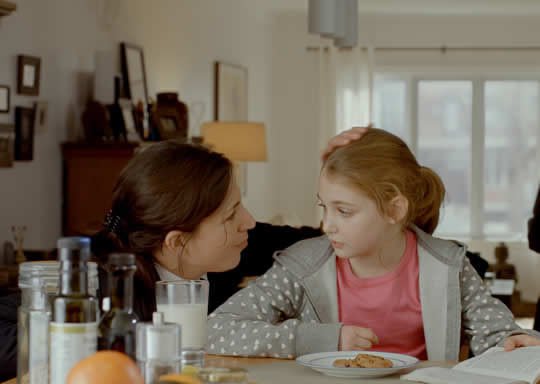 MONSIEUR LAZHAR, directed by Philippe Falardeau, is a Canadian film nominated for the Best Foreign Language Film Award at the 2012 Oscars.
MONSIEUR LAZHAR, directed by Philippe Falardeau, is a Canadian film nominated for the Best Foreign Language Film Award at the 2012 Oscars.
In Montreal, an elementary school teacher dies abruptly. Having learned of the incident in the newspaper, Bachir Lazhar (Fellag), a 55-year-old Algerian immigrant, goes to the school to offer his services as a substitute teacher. Quickly hired to replace the deceased, he finds himself in an establishment in crisis, all while going through his own personal tragedy.
The cultural gap between Bachir and his class is made immediately apparent when he gives them a dictation exercise that is beyond their reach. Little by little, Bachir learns to better know this group of shaken but endearing kids, among whom are Alice and Simon, two charismatic pupils particularly affected by their teacher’s death. While the class goes through the healing process, nobody in the school is aware of Bachir’s painful past; nor do they suspect that he is at risk of being deported at any moment.
Adapted from “Bashir Lazhar,” a play by Evelyne de la Chenelière, MONSIEUR LAZHAR depicts the encounter between two distant worlds and the power of self-expression. After CONGORAMA and IT’S NOT ME, I SWEAR!, Philippe Falardeau returns to the socially engaged filmmaking that marked his beginnings with THE LEFT-HAND SIDE OF THE FRIDGE. Using great sensitivity and humor, the filmmaker follows a humble man who is ready to transcend his own loss in order to accompany children beyond the silence and taboo of death.
Bijan Tehrani: What originally motivated you to make MONSIEUR LAZHAR? Was it the one-man play or was it your own childhood experiences?
Philippe Falardeau: When I look back at the finished work, I think that my motivation was a combination of several things: my interest in immigration, the fact that I studied political science, and my own childhood. All of this came together while scripting and making the films, but at the beginning, I think it was just seeing a play with a character that went beyond just being an immigrant. I did not want to do a paper on immigration or something too didactic, so with this character you got the sense that he had a traumatic background—a life experience that was rich and could bring growth. I could see my own society through his point of view and that was very interesting to me; to see the class and the children through the point of view of someone who is not necessarily from here and does not have the same references or culture. 
BT: There are two common themes that I found in your older films: one is of self discovery for the characters, and the other is of growing up and maturing. These themes are evident in Monsieur Lazhar as well. Is this something that you do intentionally?
PF: I think it is my obsession with Identity—the individual identity and the collective identity—that brings about these themes. Living in a province which is mainly French speaking in a continent that is overwhelmingly English speaking, we have this collective identity issue that is always there in the background. On a personal level, I am always fascinated by where we come from and, from the perspective of a man, the identity we can create from our own hands, thoughts, or ideas. If I were to start all over again and study something else, I think I would study archeology. These are passions of mine, and I think my passions find their ways into my films. So in terms of my filmmaking, I do not sit down in front of my computer and plan to include a theme of identity and growth, but I know that it will be there in all my work.
BT: The main character is such powerful and believable figure. Is this character based on a teacher that you knew in your life as a child? How did you go about creating this character?  PF: With the stage production, it was a one-man play, so there was only one character on stage and he was already very strong within himself. I asked the playwright to be the first reader of my script and she would be the guardian of her own character. I did not want to take her character and do something else with it, I wanted to be true to her work. Beyond that, you come in with all of the subtleties, like who would play the character and the dialogue—some of which is taken from actual conversations from my childhood. The actor who plays Lazhar, Mohamed Fellag, was a stand up comedian in France. His style is very different from the tone of my film. When I saw him for the first time, it was on YouTube, I thought, this is not at all the tone that I want for my film—I liked his face and his body, and I liked the way he moved. I thought he encompassed the quality of dignity, and that was important for that character. So if I had to work from one main quality while building on the character, I think it would be dignity.
PF: With the stage production, it was a one-man play, so there was only one character on stage and he was already very strong within himself. I asked the playwright to be the first reader of my script and she would be the guardian of her own character. I did not want to take her character and do something else with it, I wanted to be true to her work. Beyond that, you come in with all of the subtleties, like who would play the character and the dialogue—some of which is taken from actual conversations from my childhood. The actor who plays Lazhar, Mohamed Fellag, was a stand up comedian in France. His style is very different from the tone of my film. When I saw him for the first time, it was on YouTube, I thought, this is not at all the tone that I want for my film—I liked his face and his body, and I liked the way he moved. I thought he encompassed the quality of dignity, and that was important for that character. So if I had to work from one main quality while building on the character, I think it would be dignity.
BT: In MONSIEUR LAZHAR, you have several layers of different themes and subjects: children, the pain of growing up, and immigration, amongst others. Is it very difficult to mold all of these themes together in one film? How did you manage to do this?
PF: It’s funny because, if I were to teach a workshop for young writers, I would tell them to avoid piling on all of these issues. But I have difficulty following the most basic scriptwriting rules myself. I think it is because I draw on life, and life is never one issue at a time—sometimes you have multiple issues, but they can appear at different moments. The way I was able to blend it was to make sure that all of these issues were in the canvas of the film, and that the characters did not speak in ideas, but instead they spoke their minds. The film takes place mostly in a classroom, and anything that happens in life can also happen in the classroom. From making friends to making enemies, to achieving-versus-failing, falling in love, from being curious to being bored—everything happens in the classroom! So from there, it does not seem like you are pushing it with the themes as long as you keep it rational and within the frame of your film.
BT: One interesting character in the film, although we really do not see her, is the teacher that committed suicide. She has such a strong presence all throughought the film. How did you manage this?
PF: Well in the play, she was only mentioned once in the middle, and I knew that people had to have the feeling of that person. We had to fulfill a presence through the point of view of the young boy. and this image has such an impact and this teacher is there in the whole film. This is a very tough process. The way the film opens, it is a two-shot of the school yard and an angel watching over the school and this could very well be the spirit of the late teacher.The fact that some of the children are grieving and the fact that they feel guilty, it shows that Marchanz maintains a presence with them and stays with the film. I did not want the film to be only about suicide though, because that would be overwhelming.
BT: How did you come up with the visual style of the film?
PF: Well, that was quite simple because I thought that this film needed light and needed to be luminous; it needed to have windows and be very well lit by natural light. I did not want the film to be overly aesthetic, as the film progressed, the color became a little warmer. When you start working on a production, the DP wants to know what your looking for in terms of style. So it was difficult for me to tell the man that wanted to do the imagery that there is not going to be any particular look on the film except for the natural elements. I wanted the imagery to appear in the most natural way possible on screen.
BT: How has the nomination helped the film, and how would winning the Oscar help your future?
PF: It might be a contradiction or some odd irony there. I have made four films and they were all films that I actually wanted to make. If I win an Oscar, I might have a chance to make bigger films in the United States, but they will not be my personal films—So there is an irony there. So I want to keep a cool head about all this and remember that it was an intimate film that got me here to the Oscars.
BT: Do you have any future projects lined up?
PF: I am working on a political comedy, since I am a student of political science, and because of my personal interest with this new life I have. When I was in my twenties I wanted to blend the two of them and make a parody of western philosophy and try to poke fun at the downside of our democratic system.
BT: That sounds promising. Thank you for speaking with us about your films!

